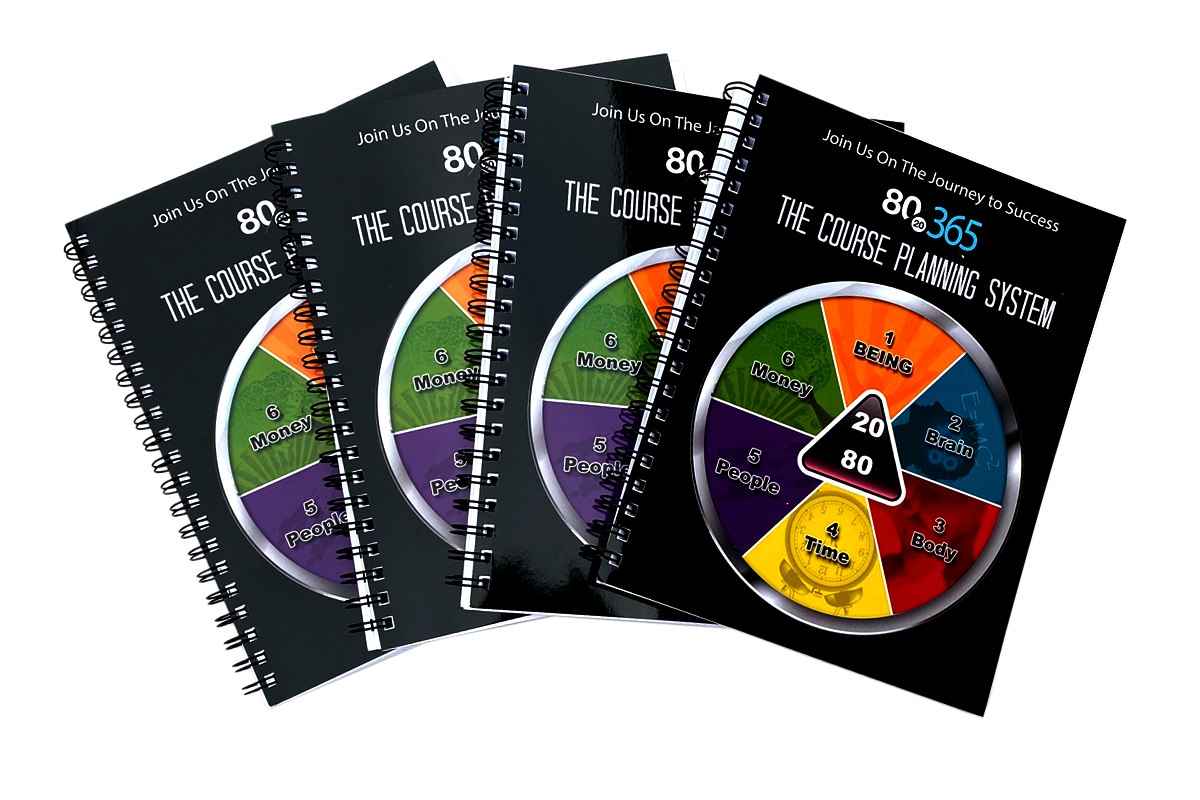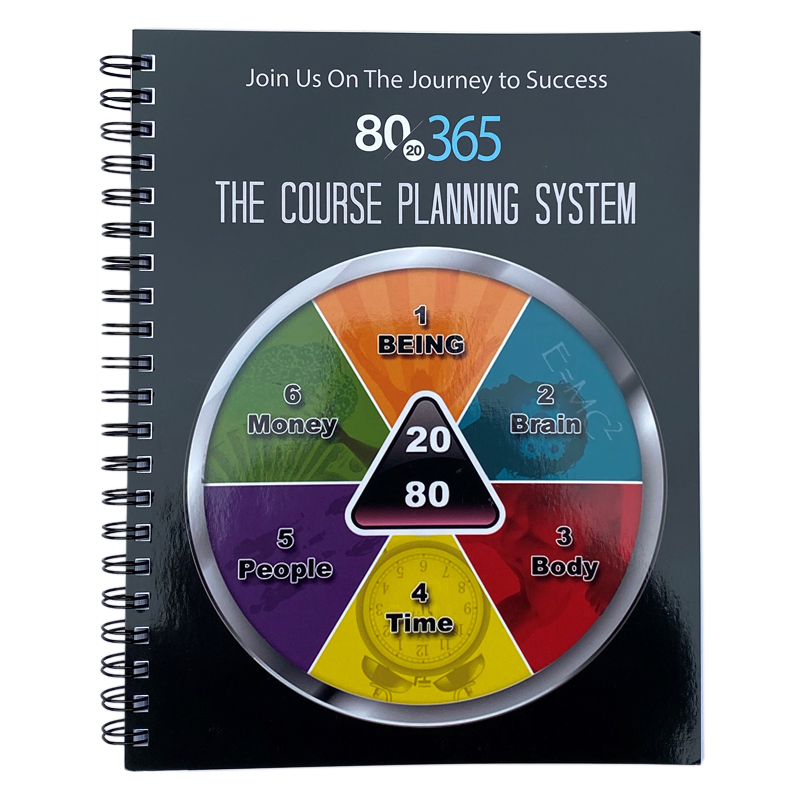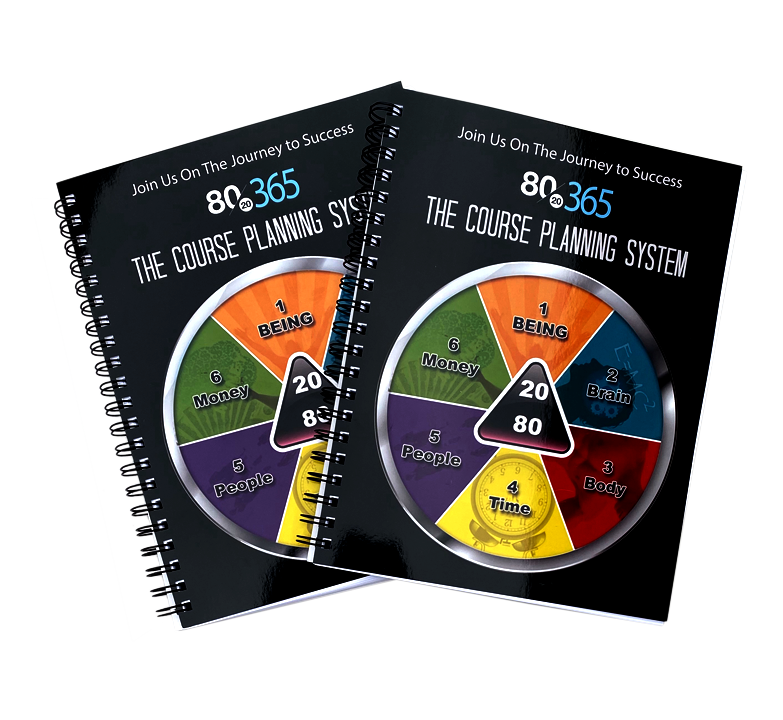8020365 - Life Planning System and Monthly Calendar
$273.75 $365.00
Join us on the journey to success “The Course Planning System”, an Introduction to living a balanced life, the 80/20 mindset, and living life well planned.
FREE SAMPLE AND WELCOME KIT:
Not sure about the 8020365 system? Get the 8020365 Sample Kit delivered to your door and in digital format. Click Here to View
Ever know someone who was so strong in one area but neglected other areas? That is not success. Ever know someone who focused so intently on their career that their marriage or family life suffered or maybe even got divorced? Ever meet someone who made a lot of money but lost their health in the process?
There are six major areas of your life which must be kept in check otherwise – life is out of balance. We have all been there before. One of the fastest ways to get off purpose is to lose your balance. One must focus on all 6 of the major areas in your life to stay on track; Being, Brain, Body, Time, People and Money.
Being
Your self worth, your connection with your creator and the world around you. Harmony, Discord, Spiritual relationships, and Self-esteem.
How do you feel about yourself? What do you need to change? What is your religious beliefs or spiritual connections? Do these need to be improved upon or strengthened?
Brain
Your mind, your mental acuity, reasoning skills and logic. Your education levels including both school and life experience.
Do you need training in any certain area? Are there new things that you would like to know, new skills to acquire?
Body
Your health, fitness and dietary levels.
Can you improve? Loose weight/gain weight? Increase your fitness levels? Rehabilitate from injuries? Change your diet? What do you need to make the optimal you?
Time
The 24 hours in a day or 1,440 minutes or 86,400 seconds that we are allotted to accomplish the tasks we have in front of us.
What do you waste your time doing? Are there non-essential tasks that you can leave off each day or do less frequently?
People
Our connections with others. Those who influence us and whom we influence through thoughts, actions, ideas and notions. Those whom we allow to be in our lives.
Who do you associate with? What influence do these people have on you, your thoughts and emotions? Are they positive productive people or energy taking negative people? Are you associating with the right people to complete your goals and succeed in life? Are they influencing you to live your life to the fullest potential?
Money
Our financial well-being. Our incomes, investments and expenditures. Whether you have a lot or a little, What are you spending it on? What can you leave off each day/week/month? Do you have investments? A retirement plan? If you are paycheck to paycheck… what can you do to change or improve this situation?
The 80/20 Rule Applied Daily: Mastering Time Management with PurposeThe 10 Most Important Benefits of Time Management
1. Reduced Stress Managing your time effectively reduces feelings of overwhelm, improves confidence, and fosters a sense of control over your day. By prioritizing important tasks, you meet deadlines with ease and minimize anxiety.
Action Tip: Identify three major causes of stress. Set one action step for each to eliminate or reduce it.
2. Better Work-Life Balance Good time management helps you create a healthy balance between your personal and professional life. This balance prevents burnout and allows you to focus on relationships and self-care.
3. More Time Freedom When you manage your time wisely, you free up hours to pursue hobbies, deepen relationships, and work on your biggest goals.
Action Tip: Write down three activities you would focus on with an extra 5–10 hours per week. Create a simple plan to make this possible.
4. Greater Focus Time management enhances your ability to concentrate on high-priority tasks, allowing you to achieve better results in less time.
5. Higher Productivity By working smarter—not harder—you can accomplish more in a shorter timeframe. Prioritizing daily tasks ensures you direct your energy toward the most impactful activities.
6. Less Procrastination Effective time management reduces distractions and provides clarity, making it easier to tackle tasks without delay.
Action Tip: Identify three causes of procrastination and plan actionable steps to overcome each.
7. Simpler and Easier Workflows Organizing your time simplifies decision-making and reduces frustration. Proper planning helps you tackle tasks with confidence and clarity.
8. Fewer Distractions Good time management eliminates unnecessary interruptions, allowing you to stay focused on your priorities.
9. Increased Energy Time management promotes regular breaks and balanced workdays, ensuring sustained energy and focus throughout your tasks.
10. Time for Strategic Thinking By managing your time, you create space for brainstorming, planning, and reflecting on your long-term goals.
Daily Practice:
• Identify Priorities: Start your day by listing tasks and identifying the top 20% that contribute most to your goals.
• Eliminate the Unnecessary: Minimize time spent on low-impact activities or delegate them.
• Set Boundaries: Protect your time by setting clear limits and saying no to distractions.
• Focus on High-Value Work: Dedicate uninterrupted time to critical tasks to maximize effectiveness.
If you’re ready to take control of your time and unlock greater success, consider implementing these strategies or exploring tools like WORK & MOVE Software to streamline your efforts further.
What is the 80/20 Rule?
In 1906, Italian economist Vilfredo Pareto created a mathematical formula to describe the unequal distribution of wealth in his country, observing that 20 percent of the people owned 80 percent of the wealth. In the late 1940s, Dr. Joseph M. Juran inaccurately attributed the 80-20 Rule to Pareto, calling it Pareto’s Principle. While it may be misnamed, Pareto’s Principle or Pareto’s Law as it is sometimes called, can be a very effective tool to help you manage effectively. Pareto’s Principle is – The 80-20 Rule.
Where did the 80/20 Rule/Pareto Principle come from?
After Pareto made his observation and created his formula, many others observed similar phenomena in their own areas of expertise. Quality Management pioneer, Dr. Joseph Juran, working in the US in the 1930s and 40s recognized a universal principle he called the “Vital few and Trivial many” and reduced it to writing. In an early work, a lack of precision on Juran’s part made it appear that he was applying Pareto’s observations about economics to a broader body of work. The name Pareto’s Principle stuck, probably because it sounded better than Juran’s Principle. The result, Dr. Juran’s observation of the “vital few and trivial many”, the principle that 20 percent of something always are responsible for 80 percent of the results, became known as Pareto’s Principle or the 80-20 Rule.
What does the 80/20 Rule mean?
The 8020365 Rule means that in anything a few (20 percent) are Vital and many(80 percent) are Trivial. In Pareto’s case it meant 20 percent of the people owned 80 percent of the wealth. In Juran’s initial work he identified 20 percent of the defects causing 80 percent of the problems. Project Managers know that 20 percent of the work (the first 10 percent and the last 10 percent) consume 80 percent of your time and resources. You can apply the 80-20 Rule to almost anything, from the science of management to the physical world.
Example:1 Let’s compare your time to your money and show you the power of the Vital few and the results form the Trivial many. Benjamin Franklin did this on more than one occasion. To make this easy to understand the power of this principal, suppose you were to invest $1,000. You buy two investments and you put 8200 into investment A. and $200 into investment B. After a year or so you check up and find that your 800 in investment A. has earned you a profit of $200. Investment B. has only earned you a $800 return. What we are directing your attention to here is that each dollar invested in B. earned 400% ROI or 16 times more money than a similar dollar invested in A. One was a low payoff investment, the other by comparison a high payoff investment. Where do you wish you could have invested your $100,000 or even a million dollars.
Example:2 As a manager you become aware that 20 percent of your stock takes up 80 percent of your warehouse space and that 80 percent of your stock comes from 20 percent of your suppliers. You also notice that 80 percent of your sales will come from 20 percent of sales staff. Upon further review you find 20 percent of the staff have reported 80 percent of the production problems, but the top 20 percent of your staff will provide 80 percent of your production and satisfaction. You report your findings in a regular scheduled management meeting and soon afterwards you asked to the Presidents office for a private meeting to discuss your findings. Three months later you are given a new position and a raise. It works both ways.
How can the 80/20 Rule help you everyday?
The value of applying and understanding the Pareto Principle for a manager is that it reminds you to focus on the 20 percent that matters. Of the things you do during your day, only 20 percent really matter or are the vital few high payoff items. Those 20 percent produce 80 percent of your results. By identifying and focusing on those 20 percent, one can become a high payoff time manager. The 8020365 system does this automatically for you while learning to live life with balance in all areas of your life and reporting to you what requires attention and what requires less attention.
When the race of your life begins like it does for everyone everyday, remind yourself of the 20 percent you need to focus on and not the 80 percent. There will be times in your daily schedule where new 20 percent tasks and activities have to be added replacing previous older 20 percent tasks and items. Thus a pr- scheduled 20 percent has to be moved as a new task or appointment has been made. Naturally the prescheduled 20 percent has to slip to a less important 20 percent task, the objective here is to make sure you are focusing on all high payoff tasks and activities.
Apply the Pareto Principle to all you do, but use it wisely. Sign up for a 30-day free account today and begin to apply this principle. It’s a 20 percent high payoff item and its risk free.
Adam Vincent Gilmer produces a weekly podcast on his life's success and how he uses the 80/20 Rule to help succeed in a well balanced life.
View all the weekly Podcasts.
Adam Vincent Gilmer travels the world and offers workshops wherever he travels.
USA - Free 3-6 Day delivery
Canada - Flat rate of $25 (Delivery time is between 6-12 days)
International - Rates vary depending on location. You can get an estimate by adding the product to the cart and use the shipping calculator. If you have problems or questions please feel free to contact us.










